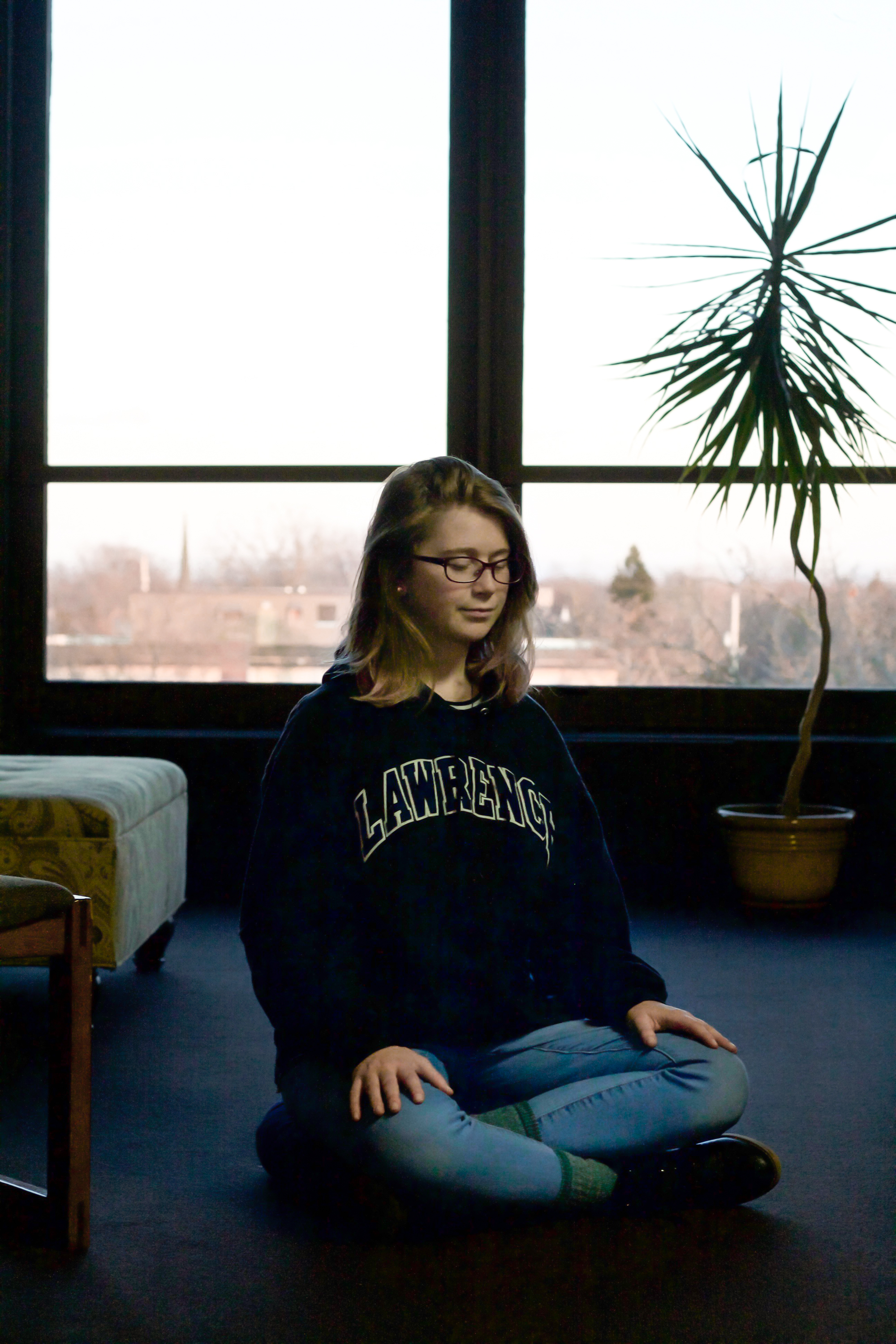Tashi Haig practicing mindfulness in the Kruse Room located on the 4th Floor of Seeley G. Mudd library.
Photo by Hannah Burgess.
This column is intended to inform students and other members of the Lawrence community about the resources and events that are offered at the Seeley G. Mudd Library. This is a source for little-known library facts, staff spotlights and investigations into the archives of Lawrence and Milwaukee-Downer College.
As the sun set, spilling light into the wide windows of the Kruse room, students joined counselor Rachel Hart in a circle of chairs and cushions while quiet, soothing music seeped into the background. With closed eyes and comfortable body posture, Hart began the afternoon’s ‘Mindfulness in the Mudd’ session with gentle encouragement for students to simply sit still and pay attention to breathing and thoughts as they flowed through the their minds and bodies. Over the course of half an hour, Hart’s soothing instruction allowed those present to release the tension of the day and simply breathe.
With the stress of looming midterms (or anticipated midterm grades), as well as juggling all of the responsibilities that have built up by fifth week, it is essential to take a moment for yourself to de-stress. The ‘Mindfulness in the Mudd’ programs offered in the Kruse room of the Seeley G. Mudd Library offer just such a necessary opportunity. Led by Library Administrative Assistant Holly Roycraft on Fridays from 10:30-11 a.m. and by counselor Rachel Hart from 4:45-5:15 p.m., these moments of mindfulness offer students, faculty and staff a chance to literally take a breather from an intense day.
Roycraft explained the basic course of her mindfulness program. “We start each session by taking some time to settle into our bodies and notice our breath. We do some simple, relaxing stretches in the chair and close with a guided meditation,” she explained, adding, “My hope is that by connecting attendees to their bodies and to their breath that they will be able to stay present with their feelings and experiences.” Drawing from experience as a yoga instructor, Roycraft emphasized the importance of reconnecting with your body in order to remain in a state of balance and health despite difficult times.
“Our practice fosters connection with the most important person in our lives, ourselves, and gives us the tools and the space to sit with our emotions and with our truth,” Roycraft stated. While it may seem that sitting still for half an hour is too much for your overworked brain to handle, Roycraft emphasized that “a big misperception about mindfulness practice is that you can only practice when you’re peaceful, or that if your mind wanders all over the place you’re doing something wrong.” Rather, mindfulness exercises are meant to “[allow] us the space to simply watch what is happening inside our minds and bodies with compassion,” Roycraft continued.
While Roycraft combines mindfulness with yoga, Counselor Rachel Hart focuses mainly on the benefits of simple breathing mindfulness. Hart’s program is newer, having only started this winter term, while Roycraft began the initial ‘Mindfulness in the Mudd’ program in spring term of 2017.
“We’ve been talking for a while about getting more established here, getting more of a practice and a presence of mindfulness on campus,” Hart mentioned. The addition of Hart’s program is part of a growing initiative to offer students multiple opportunities to practice mindfulness in accommodation of their busy schedules.
Though it may be hard to force oneself to intentionally sit still and do nothing for a half hour, the overall benefits of mindfulness are a worthy investment of time. Hart spoke to the positive changes which could overcome those who practice mindfulness: “There are so many different benefits that it may be different for everybody that comes, but my hope is that people will find that they feel more balanced, less reactive to things that are going on externally like stress and all the demands that we all have on campus and just the ability to feel emotionally and mentally balanced.”
Along with the instructors’ own hopes of improvement for themselves and others, Hart and Roycraft’s mindfulness sessions are backed up by many articles and scientific studies which only expand the list of benefits one can gain from this form of self-care. Hart emphasized, “Research has supported and promoted…lower levels of stress, less anxiety, depression, anger and worry, greater sense of well-being; those kinds of things, which tend to be most associated to what my goal has always been through practice.”
The library has several books and articles containing research about mindfulness for any students interested in learning more about the ways in which mindfulness affects the body and mind. Famous figures such as Thich Nhat Hanh and His Holiness the Dalai Lama are among the available authors for students to learn from, and subjects range from mindfulness while eating to studies on how practicing mindfulness helps college students and anyone suffering from anxiety, depression or simply a great deal of stress.
In the upcoming weeks, taking a moment to reset can make all the difference in handling the stress of exams and a growing workload. Though this coming Monday, Feb. 5’s afternoon session will be cancelled, mindfulness is otherwise scheduled every Monday at the previously stated times. The books and articles on mindfulness are another excellent way for students to learn more. Though the library is often a place for pulling late night study sessions, it can also be a place for students to take a much deserved break.

